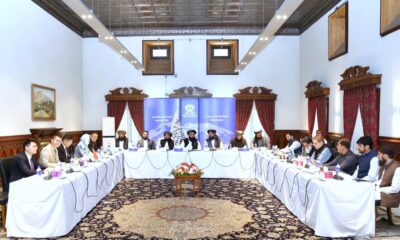Latest News
Turkey conference on Afghan peace postponed

Reuters quoting sources that the US-backed Afghan peace conference in Turkey has been postponed over non-participation by the Taliban.
Turkey announced Tuesday that it is postponing a much-anticipated Afghan peace conference in Istanbul until the end of the Muslim holy month of Ramadan, Anadolu Agency reported.
“We have consulted with Qatar, the US and the UN,” Mevlut Cavusoglu, Turkish Foreign Minister said on Wednesday. “We have decided to postpone the Istanbul Conference on the Afghanistan peace process after Eid al-Fitr.”
“The conference would be meaningless without the Taliban joining. At the moment, we decided to postpone it since there is no clarity about the formation of the delegations and participation…The aim is not to initiate alternative talks to Doha but to contribute to the process. Hosting the meeting together in Istanbul will be Turkey, Qatar and the UN,” Anadolu quoted Cavusoglu.
The conference was scheduled for April 24 and was expected to see inclusive participation from parties to the Afghan conflict.
Although the US, Turkey, Qatar and UN have reportedly attempted to convince the Taliban group to attend the planned meeting in Turkey but the group has insisted that the US first need to implement the Doha deal.
Following the announcement that all foreign troops will be out of Afghanistan by September and not May 1 as per the US-Taliban agreement signed in February last year, the Taliban said it will not participate in any conference on Afghanistan’s future until there has been a full withdrawal of all foreign forces.
Mohammad Naeem, the group’s Qatar-based spokesman announced last week that the group would not attend the Turkey Conference until all troops had left.
Meanwhile, the Afghan government on Tuesday said the list of a republic delegation for the conference has been finalized.
This comes as the US, UN, Turkey, and Qatar have handed over guiding principles for the Istanbul Summit to the Afghan government and the Taliban.
A document seen by Ariana News shows that there are nine guiding principles that could help the negotiating parties reach an agreement on some key points ahead of the Istanbul conference.
The principles include:
1- A permanent and comprehensive ceasefire is needed for the country
2- Conducting joint work for the restoration of peace without mutual accusation
3- Political partnership under Islamic principles
4- Formation of an inclusive and accountable participatory government
5- Future political arrangements need to reflect the diversity of Afghan society by way of providing equal rights for all citizens and without discrimination
6- Protecting and supporting human rights in Afghanistan
7- Future government will implement a balanced socio-economic development program to cope with poverty in Afghanistan
8- Afghanistan will maintain friendly relations with its neighbors, the region, and the international community
9- The two parties have to engage in peaceful negotiations in order to implement these principles
Latest News
Baradar meets Mes Aynak project director, urges quick construction start

Deputy Prime Minister for Economic Affairs, Mullah Abdul Ghani Baradar, on Saturday in Kabul met with Wang Zhicheng, the Director General of the contracting company for the Mes Aynak copper mine in Logar province.
During the meeting, Baradar described Mes Aynak as one of Afghanistan’s key economic projects and emphasized that the Islamic Emirate has provided all necessary facilities to support the contracting company in advancing the project, according to a statement from his office.
Baradar urged the company to begin the construction phase of the project as soon as possible and to address any issues causing delays.
Wang Zhicheng, Director General of MCC, praised the cooperation of the Islamic Emirate in furthering the project.
He mentioned that significant progress has been made in several aspects of the Mes Aynak project and expressed readiness to proceed with the next steps in coordination with the Ministry of Mines and Petroleum.
The Aynak copper mine contains millions of tons of copper and is believed to have the second-largest copper reserve in the world.
The contract for the Aynak copper mine was signed in 1999 with the Chinese company MCC for 30 years, but due to security issues and prolonged excavations of ancient relics in the area, the extraction of copper was delayed.
Latest News
Afghanistan, Pakistan and China agree to hold sixth round of FMs’ talks in Kabul
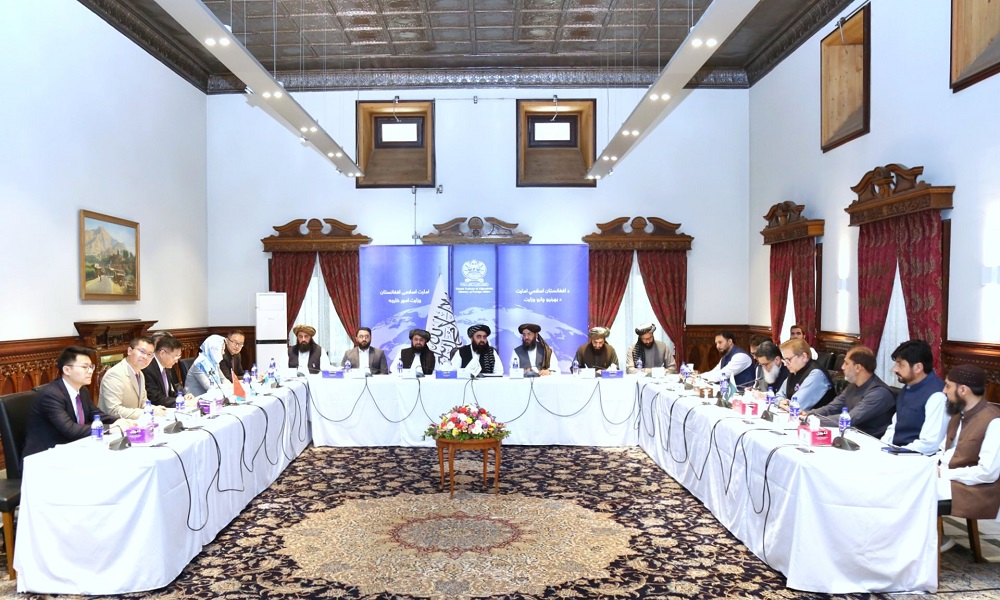
The special representatives of Pakistan and China for Afghanistan, along with Amir Khan Muttaqi, the acting foreign minister of Afghanistan, agreed in a trilateral meeting held on Saturday that the sixth round of foreign ministers’ talks among the three countries will be held in Kabul.
Zia Ahmad Takal, Head of Public Relations at the Ministry of Foreign Affairs, said in a statement that Muttaqi, Yue Xiaoyong, and Mohammad Sadiq also agreed to begin preparations for the upcoming meeting of the foreign ministers of Kabul, Islamabad, and Beijing.
Today’s trilateral meeting addressed follow-up issues related to the fifth round of foreign ministers’ dialogue among Afghanistan, China, and Pakistan, as well as discussions on political and economic cooperation among the three countries.
During this meeting, Muttaqi emphasized the importance of political and economic relations between Afghanistan and the two countries and expressed hope for “significant progress” in these areas in the future.
The special envoys from China and Pakistan reaffirmed their commitment to strengthening relations with Afghanistan based on good neighborliness and mutual respect.
Pakistan’s envoy Sadiq also said in a post on X page that today’s trilateral meeting provided an opportunity to align views on economic and security cooperation, as well as regional stability.
Latest News
Pakistan says India launched attack on Afghanistan, India denies
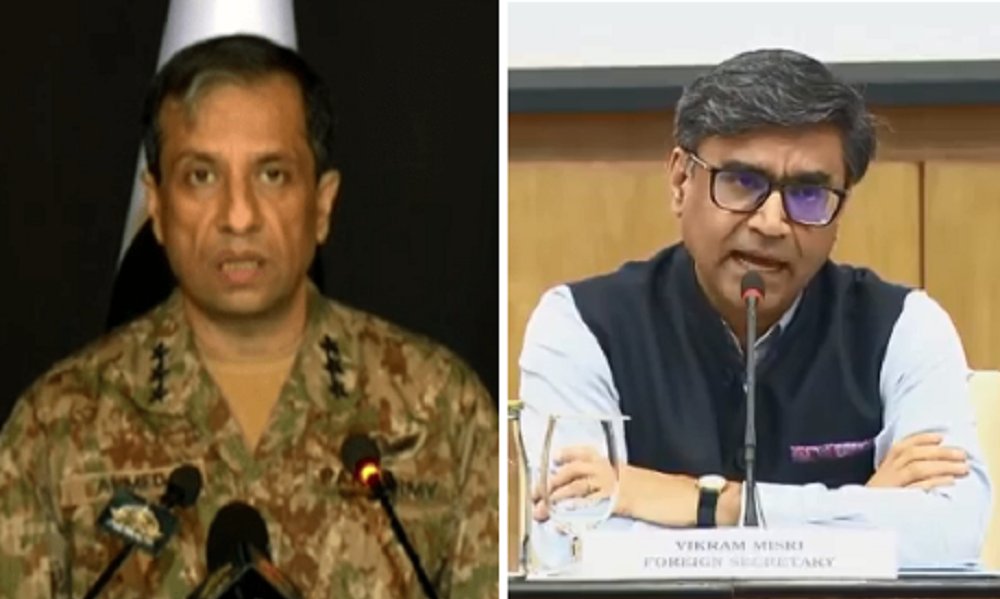
The Pakistani military has claimed that India launched missile and drone attack on Afghanistan.
Pakistan Army spokesman Ahmad Sharif Chaudhry made the claim at a news conference, calling Afghanistan a “brotherly” country.
India, however, has rejected the claim as “ludicrous.”
“I only want to point out that the Afghan people don’t need to be reminded about which country it is that has, on multiple occasions in just the last one and a half years, targeted civilian populations and civilian infrastructure in Afghanistan” said Indian Foreign Secretary Vikram Misri.
-

 Latest News5 days ago
Latest News5 days agoCabinet Meeting convened to discuss Afghanistan’s population census plan
-

 International Sports5 days ago
International Sports5 days agoIPL 2025: Seven teams fighting for four spots
-
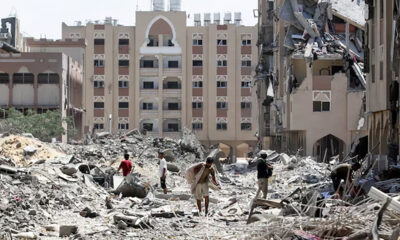
 World5 days ago
World5 days agoIsrael may seize all Gaza in expanded operation, officials say
-

 Regional4 days ago
Regional4 days agoAt least 26 civilians killed in Indian strikes on Pakistan: Islamabad
-
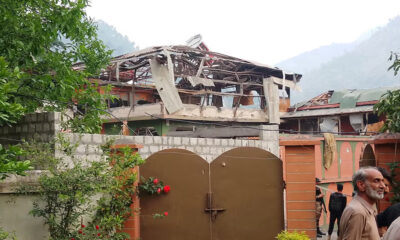
 Regional4 days ago
Regional4 days agoIndia strikes Pakistan over Kashmir tourist killings
-

 Science & Technology4 days ago
Science & Technology4 days agoSkype ends operations after 22 years of service
-

 Latest News4 days ago
Latest News4 days agoIslamic Emirate of Afghanistan ‘concerned’ over rising tensions between Pakistan and India
-

 World4 days ago
World4 days agoMacron to meet Syrian president on Wednesday, expected to discuss security








